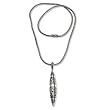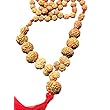1. Wayang Puppets
Indonesians have used puppets for centuries to tell the stories of the Ramayana, Mahabharata and ancient myths as well. Indonesian puppets may be divided in two categories: wayang kulit (leather or shadow puppets) and wayang golek (wooden puppets). Different regions have their own styles of wayang puppets, but they are all handmade. Wayang puppets represent all kinds of characters - good guys, bad guys, gods, demons, animals and so on. Though, sometimes, objects from the modern world, like airplanes, cars and others, are also made, they are mostly for comic effect. Generally, the traditional designs for making wayang puppets have not changed much over the last 300 years. The puppets are made by groups of artists, each one performing a certain operation. Nowadays, wayang puppets are still quite popular and used to depict modern stories, as well as old ones. Prices for wayang puppets start at $10.
Where to find it:
Sarinah Department Store
Address: Jl. Mohammad Husni Thamrin 11, Jakarta 10350, Indonesia
Opening hours: Monday-Sunday: 8:00 – 20:00
Phone: +62 21 31923008
E-mail: customer_care@sarinah.co.id
Website: http://www.sarinah.co.id/
Jalan Surabaya (Surabaya Street Market)
Address: Jalan Surabaya, Menteng, Indonesia
Opening hours: Monday-Sunday: 9:00 – 17:00
Phone: +62 21 31904580
Pasaraya Grande
Address: JL. Iskandarsyah II/2, Jakarta 12160, Indonesia
Phone: +62 21 7222221
Website: http://www.pasaraya.co.id/
Pasar Seni (Art Market)
Address: Jalan Aquarium, Jakarta 14430, Indonesia
Phone: +62 651 999 9016
Offline reading and travel directions:
With GPSmyCity App you can read this article offline on your mobile device, use the embedded offline city map and GPS navigation, as well as create a self-guided walk to visit the venues featured in the article.
2. Congklak (Dakon Board Game)

Congklak is a game that has its origins either in the Middle East or in Central Africa. The game was brought to Indonesia by traders, then adopted by the locals. Historical references refer to Congklak as the game played by young girls of the Javanese nobility. Later, the popularity of the game increased and it began to be played by the common folk as well. In most Indonesian regions Congklak is considered to be a girl's game; only a handful of regions has it played also by men and boys.
The board for this game is usually made of wood and it has 5, 6, 7 or 9 holes on each side, depending on the region. All versions have two larger holes on both ends. The board may be simple or decorated, boat-shaped, carved and painted. The usual colors are gold and red. In ancient times, the game was played with stones, seeds or shells and it continues to be played this way today. The goal of the game is to gather more seeds than the opponent. There are various versions and names of the game, but whatever version you may play, it is equally challenging in terms of patience and skill. A Congklak game board costs about $20.
Where to find it:
Sarinah Department Store
Address: Jl. Mohammad Husni Thamrin 11, Jakarta 10350, Indonesia
Opening hours: Monday-Sunday: 8:00 – 20:00
Phone: +62 21 31923008
E-mail: customer_care@sarinah.co.id
Website: http://www.sarinah.co.id/
Jalan Surabaya (Surabaya Street Market)
Address: Jalan Surabaya, Menteng, Indonesia
Opening hours: Monday-Sunday: 9:00 – 17:00
Phone: +62 21 31904580
Offline reading and travel directions:
With GPSmyCity App you can read this article offline on your mobile device, use the embedded offline city map and GPS navigation, as well as create a self-guided walk to visit the venues featured in the article.
3. Batik Textiles

Batik is a cloth made traditionally using a manual wax-resistant dyeing technique. It has been practiced in Indonesia since ancient times. The traditional colors of Javanese batik are indigo, dark brown and white. Certain patterns were worn only by nobility, others by royalty, and so on. Each region of Indonesia has its own unique patterns for batik that includes flowers, animals, folklore or people. Nowadays, batik is also produced by automated techniques and is called batik cap and batik print. The handmade batik is nowadays known as batik tulis (written batik).
In Indonesia, batik is used for traditional and everyday clothing; there are patterns and colors used for certain ceremonies. For special occasions, batik was decorated with gold leaf or dust, and was known as “prada”. Such cloth today is made with gold paint. Batik clothing still plays an important role in certain Indonesian rituals. Batik, in different forms, is worldwide popular these days. Depending on the quality of art work, craftsmanship and fabric, batik may cost from several dollars to several thousand dollars apiece.
Where to find it:
Tenun Baron
Address: Mitra Hadiprana Boutique Mall, Jl. Kemang Raya 30, Jakarta, Indonesia
Operation hours: Monday-Saturday: 10:00 – 17:00
Phone: +62 21 718 2779
Datie Handicraft
Address: Jl. Hangtuah Raya 11, Kebayoran Baru, Jakarta, Indonesia
Phone: +62 21 724 6960
Carmanita
Address: Jl. Wijaya Timur Raya 99, Kebayoran Baru, Jakarta, Indonesia
Phone: +62 21 7397380
E-mail: amtrends@cbn.net.id
Website: http://www.carmanita.com/
Sarinah Department Store
Address: Jl. Mohammad Husni Thamrin 11, Jakarta 10350, Indonesia
Operation hours: Monday-Sunday: 10:00 – 20:00
Phone: +62 21 31923008
E-mail: customer_care@sarinah.co.id
Website: http://www.sarinah.co.id/
Pasar Baru
Address: Jalan Pasar Baru, Kebon Kelapa 10120, Indonesia
Phone: +62 21 26836259
Buy It on Amazon:
Offline reading and travel directions:
With GPSmyCity App you can read this article offline on your mobile device, use the embedded offline city map and GPS navigation, as well as create a self-guided walk to visit the venues featured in the article.
4. Indonesian Jewelry

Jewelry making has a rich tradition in Indonesia, and its history goes back to the times immemorial. Indonesian jewelry is made out of a variety of materials, such as pearls, diamonds, opal, sapphire, amethyst, agates and even the shards of ancient Chinese ceramics. There are many designs, modern and traditional, that differ from island to island.
The most popular jewelry in Indonesia is made of silver and opals. Another favorite are mabe pearls. These pearls differ from the others due to their semi spherical shape and the fact that they grow against the inside of the shell, not inside the body of the mollusk, as is the case with other pearls. The most affordable Indonesian jewelry is made out of the shards of ancient Chinese ceramics that are found on the shore where ancient ports used to be. Sometimes, the ceramics that was brought to Indonesia by Chinese traders got broken on the way and the shards were thrown away in ports. Today, these shards are used by jewelers to make original beautiful items. Indonesian jewelry may cost from a few hundred dollars to several thousand.
Where to find it:
Pasar Baru
Address: Jalan Pasar Baru, Kebon Kelapa 10120, Indonesia
Phone: +62 21 26836259
Ambassador Mall
Address: Jl. Prof. Dr. Satrio, Jakarta 12940, Indonesia
Opening hours: Monday - Sunday: 10 am - 9 pm
Phone: +62 21 57853287
Rawa Bening Market (Pasar Rawa Bening)
Address: Bekasi Barat Raya St., Matraman, Jakarta 13110, Indonesia
Opening hours: Monday - Thursday; Saturday, Sunday: 10 am - 4 pm; Friday: 2 pm - 5 pm
Pasaraya Grande
Address: JL. Iskandarsyah II/2, Jakarta 12160, Indonesia
Phone: +62 21 7222221
Website: http://www.pasaraya.co.id/
Buy It on Amazon:
5. Local Carvings (Wood and Stone)
Stone carving in Indonesia dates back more than 900 years and the skill was honed largely during the construction of the temples. The volcanic rock is carved to make statuettes depicting characters from ancient myths and epics. Wood carving is spread even more across the archipelago with each island having its own traditions and designs. Ancient carvings were usually masks representing spirits and were used in burials and for communicating with different spirits; later, they began to be used for many traditional dances. The woods used in carving are ebony, teak, mahogany, ironwood, sandalwood and few others. There is a great variety of wood and stone carvings available for sale, such as statuettes, masks and others. The price for carvings depends on the material used for the object and the quality of work.
Where to find it:
Sarinah Department Store
Address: Jl. Mohammad Husni Thamrin 11, Jakarta 10350, Indonesia
Operation hours: Monday-Sunday: 8:00 – 20:00
Phone: +62 21 31923008
E-mail: customer_care@sarinah.co.id
Website: http://www.sarinah.co.id/
Jalan Surabaya (Surabaya Street Market)
Address: Jalan Surabaya, Menteng, Indonesia
Operation hours: Monday-Sunday: 8:00 – 16:00
Phone: +62 21 31904580
Pasaraya Grande
Address: JL. Iskandarsyah II/2, Jakarta 12160, Indonesia
Phone: +62 21 7222221
Website: http://www.pasaraya.co.id/
Pasar Seni (Art Market)
Address: Jalan Aquarium, Jakarta 14430, Indonesia
Phone: +62 651 999 9016
Buy It on Amazon:
6. Batik Paintings
Batik painting is an ancient form of art that has been made using an old wax-resistant dyeing technique. The batik technique is a difficult one, all the parts of a picture must be waxed at the same time and completed together. This means that the final design must be conceived before the work on the painting starts. There is no possibility to correct any color once it has been applied on batik. Batik paintings are made on fabric and the most used one is cotton due to its availability, but other cloths are also used for batik painting, such as silk, leather, wool, etc. Batik paintings feature a variety of designs, such as landscapes, floral designs, myths, village and traditional life and more. Nowadays, batik paintings are just as much appreciated as modern oil and acrylic paintings.
Where to find it:
Pasaraya Grande
Address: JL. Iskandarsyah II/2, Jakarta 12160, Indonesia
Phone: +62 21 7222221
Website: http://www.pasaraya.co.id/
Pasar Seni (Art Market)
Address: Jalan Aquarium, Jakarta 14430, Indonesia
Phone: +62 651 999 9016
Buy It on Amazon:
7. Gamelan
Gamelan is a musical ensemble featuring a variety of instruments, such as xylophones, drums and gongs, bamboo flutes and bowed and plucked strings. The word "gamelan" may refer to the group playing instruments, as well as to the instruments themselves. Usually, a gamelan is a set of instruments that are built and tuned to form an ensemble. Gamelans vary by collection of instruments, tuning, style, use of voice, repertoire and cultural context. There are no two gamelans exactly the same. Gamelans are available as souvenirs and may be bought as a whole or each instrument apart.
Where to find it:
Pasar Baru
Address: Jalan Pasar Baru, Kebon Kelapa 10120, Indonesia
Phone: +62 21 26836259
Jalan Surabaya (Surabaya Street Market)
Address: Jalan Surabaya, Menteng, Indonesia
Operation hours: Monday-Sunday: 9:00 – 17:00
Phone: +62 21 31904580
8. Kris (Keris)

Kris or Keris is an asymmetrical dagger used both, as a weapon and spiritual object. Kris played an important role in Indonesian history; it was used as a secondary weapon by soldiers, and also as a weapon of self defense by commoners. Men and women alike wore this kind of daggers. Besides being a weapon, it was also considered that every Kris had its own spirit possessing magical powers. These spirits could be both, good and evil, but if the weapon proved to be bad for one person it could be good for another. There had to be harmony between the weapon and its owner. Kris was also used to demonstrate a person's status in society; they were part of rituals and worn during ceremonies. Kris is composed of three parts: the blade, the hilt, and the sheath. These parts are often true pieces of art and are beautifully decorated with precious metals and stones.
Nowadays, Kris's spiritual role has largely diminished, making it mostly appreciated as a wonderful piece of art. A Kris may cost around $200 for a simpler one, or up to $10,000 for a beautifully decorated piece with precious metals and gemstones.
Where to find it:
Rawa Bening Market (Pasar Rawa Bening)
Address: Bekasi Barat Raya St., Matraman, Jakarta 13110, Indonesia
Opening hours: Monday - Thursday; Saturday, Sunday: 10:00 - 16:00; Friday: 14:00 - 17:00
Sarinah Department Store
Address: Jl. Mohammad Husni Thamrin 11, Jakarta 10350, Indonesia
Operation hours: Monday-Sunday: 10:00 – 20:00
Phone: +62 21 31923008
E-mail: customer_care@sarinah.co.id
Website: http://www.sarinah.co.id/
9. Aromatic Incense
Incense has been known to people for centuries, mostly in relation to religion or medicine. It has appeared in different forms: raw wood, chopped herbs, pastes, powders, liquids or oils. The most common shape incense appears today in is joss-sticks or cones. If you want to bring home a piece of Indonesia in the form of incense, there's nothing better than the fragrance coming from the exotic island of Bali, particularly that made by Gopala Bhakta Sakti. Their products are made from natural powdered roots and woods perfumed in accordance with traditional formula. Their incense comes in a variety of shapes, such as butterflies, frogs, pandas, turtles, etc., and in just as many aromas.
Where to find it:
Gopala Bhakta Sakti
Address: JL Pegangsaan Timur, Blok C/1, Jakarta, 10330, Indonesia
Phone: +62 21 3162716
10. Kopi Luwak (Civet Coffee)
Kopi Luwak or Civet Coffee is one of the most expensive and least produced kinds of coffee. It is obtained from the coffee beans eaten by an Asian Palm Civet, passed through its digestive tract and then defecated. The beans maintain their form and are then cleaned, roasted and grounded. The result is a very aromatic coffee with much less bitterness. The enzymes from civet's digestive tract make shorter peptides and more free amino acids. Kopi Luwak is produced on the Indonesian islands of Java, Bali and Sulawesi. The coffee beans for Kopi Luwak are of different varieties, so the coffee can vary in taste, however, all Luwak coffees have a shared aroma profile and lack bitterness. Being the most expensive coffee in the world, Kopi Luwak is sold for between $100 and $600 per pound. You can find Kopik Lukak served at high end coffee shops or
fine dining restaurants in Bali that offer premium and rare ingredients.
Where to find it:
Pasaraya Grande
Address: JL. Iskandarsyah II/2, Jakarta 12160, Indonesia
Phone: +62 21 7222221
Website: http://www.pasaraya.co.id/
Maharaja Coffee
Address: Jl. Melawan 26/4, Jakarta, 10730, Indonesia
Opening hours: Monday - Friday: 8:30 - 17:00; Saturday: 8:30 - 14:00
Phone: +62 21 6248148
E-mail: kopiraja@gmail.com
Website: http://www.maharajacoffee.com/
Buy It on Amazon:
11. Pottery
Pottery has been produced in Indonesia since ancient times. It was mostly earthenware and stoneware. Later, the Chinese introduced porcelain. There are many centers in Indonesia where pottery is made. The most renowned of them are Kasongan, Pundong, Melikan, Klampok, Plered, Sitiwinangun, Lombok and Singkawang. The multitude of ethnic groups, each with its own tradition, create an interesting mixture of ethnic designs. Until recently, most of the pottery made in Indonesia were plain without much ornamentation. However, with the increased exports, more decorative pottery have started to appear.
Today, Indonesian pottery includes statuettes, vases, pots and various decorative pieces. Each item costs between $5 and $100, with a higher price charged for something truly extraordinary.
Where to find it:
Sarinah Department Store
Address: Jl. Mohammad Husni Thamrin 11, Jakarta 10350, Indonesia
Operation hours: Monday-Sunday: 8:00 – 20:00
Phone: +62 21 31923008
E-mail: customer_care@sarinah.co.id
Website: http://www.sarinah.co.id/
Jalan Surabaya (Surabaya Street Market)
Address: Jalan Surabaya, Menteng, Indonesia
Operation hours: Monday-Sunday: 8:00 – 16:00
Phone: +62 21 31904580
Other Interesting Souvenirs from Indonesia
If traveling to Indonesia is not on your immediate agenda, or you simply can't afford an extra space in your luggage, fortunately, these days, you can find a wide selection of authentic and truly interesting Indonesian souvenirs online. Presented here are some of the Indonesian products sought by foreign visitors, now available online for your convenience.
1. Homegrown Beauty Products - A chance to enjoy exotic spa experience at home with this lavish gift set, a blend of premium oils and no nasty ingredients, specially formulated to pamper (soften and smooth) the skin, delivering a remarkable effect on wrinkles, fine lines, and other signs of stress on the face, as well as to repair the damaged hair and sooth the scalp. Prepped by hand: in small batches, it is gentle yet effective for daily use.




2. Organic Teas - 100% fresh, raw & natural, organically grown in the sunny fields in Indonesia without any chemical fertilizers and harmful pesticides. No artificial colors or flavorings. Useful for weight loss, refreshing the body, and augmenting the immune system.


3. Patchouli Essential Oil - Just like any fine wine, 100% pure Indonesian Patchouli oil gets better with age, delivering a luxurious, deep, mellow, and rich aroma. The older it is, the deeper is the scent - earthy, smoky, musky, and spicy. Generously added to a thick, rich lotion of shea and cocoa butter, as well as aloe vera, this is a true delight for senses!



4. Traditional Snacks - If you love international food, you can't miss the opportunity to taste Indonesia's all time favorite snacks, bringing you the mouth-watering delicious experience: cracking cheesy, real seaweed, or shrimp. Once you had a bite of it, you won't stop munching! Halal certified.




.jpg)


.jpg)


.jpg)

.jpg)






















